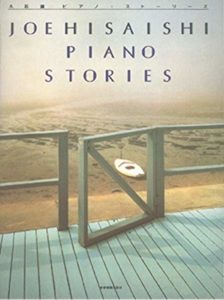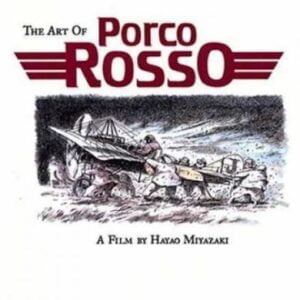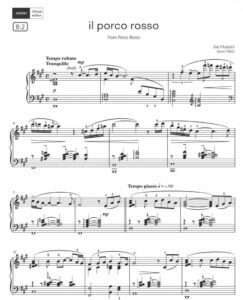Come join us now, and enjoy playing your beloved music and browse through great scores of every level and styles!
Can’t find the songbook you’re looking for? Please, email us at: sheetmusiclibrarypdf@gmail.com We’d like to help you!
Table of Contents
Joe Hisaishi PORCO ROSSO, piano solo, ABRSM Grade 8 2025-26 sheet music

Best Sheet Music download from our Library.

Please, subscribe to our Library.
If you are already a subscriber, please, check our NEW SCORES’ page every month for new sheet music. THANK YOU!
Porco Rosso Soundtrack (紅の豚 サウンドトラック, Kurenai no Buta Soundtrack) is an album released on Jul 25, 1992. It features the soundtrack of Porco Rosso.

Browse in the Library:
Or browse in the categories menus & download the Library Catalog PDF:
The music for Porco Rosso
The music for Porco Rosso, the fifth collaboration between director Hayao Miyazaki and Joe Hisaishi, was created as in the previous four films, with Joe Hisaishi first creating an image album inspired by director Miyazaki’s music notes and image boards. After that, it was produced using the methodology of composing the soundtrack for the main story again.
However, during the actual production process, two major elements that had not been seen in the previous four methodologies were added, giving the score a unique characteristic as a whole. One is the element of jazz. Another factor is that director Miyazaki paid attention to an original solo album produced by Hisaishi (not directly related to the film), and used the songs from that album in the score. Both of these are closely related to the 1920s, which is the period in which this work is set.
Although Hisaishi has a strong image as a film composer who makes full use of orchestras and as a composer of avant-garde minimal music, he has been listening to the music of Miles Davis, John Coltrane, and Mal Waldron since his student days. Takuishi is actually good at music that utilizes jazz-like idioms, and he was particularly influenced by Waldron’s piano.
The story of Porco Rosso unfolds in the Adriatic Sea, Italy in the 1920s. At that time, jazz was so popular that it was called the ‘Jazz Age,’ so Hisaishi’s choice to express the theme for the main characters Marco and Gina using jazz piano was a logical choice from a chronological perspective. Probably. In fact, this theme is played for the first time in the main story, in a jazz setting played on a piano in a bar. This is the “Days of No Return” heard on this album.
However, that is not the only reason why this theme was written on jazz piano.
In other words, the jazz piano theme of Days of No Return also serves to evoke the cinematic memory ofCasablanca” through music. However, Hisaishi did not write this theme in the style of as time passes by'', but instead he wrote it as a theme based on Miyazaki's unique music, the Hisaishi melody”, while keeping it in line with director Miyazaki’s worldview. That is the great thing about this theme, and it is no exaggeration to say that it is the most important point that makes Porco Rosso''Porco Rosso.”
To briefly touch on other songs that came out of the Image album, the theme for the Mammayuto air pirates, Flying Boatmen, was written as a kind of parody of military marches. It's a song that skillfully expresses the brave yet somewhat stupid characters of the sky pirates. A mandolin joins the performance midway throughThe Piccolo Women,” a cheerful theme about the female workers working at the Piccolo Company, and it goes without saying that the choice of instrument reflects the Italian setting.
Hisaishi released his own solo album My Lost City'' in February 1992, almost parallel to the production of thePorco Rosso” image album. Inspired by the works of F. Scott Fitzgerald, which Hisaishi loved reading at the time, this work is themed around the 1920s, or the ‘Jazz Age’ era, as depicted by Fitzgerald (the album’s name is also a reference to Fitzgerald’s essay). (derived from the title of the collection). Porco Rosso is also set in the 1920s, but the period setting for My Lost City” comes from Fitzgerald and was not inspired by Porco Rosso.'' Despite this, Hisaishi says,It felt very fateful” that his solo album and director Miyazaki’s latest work happened to cover the same era.
Joe Hisaishi (biography)
Composer, Conductor, Pianist
He started to show his interest in minimal music when he was a student at Kunitachi College of Music, and started his career as a contemporary music composer.
Presentation of MKWAJU in 1981 and the release of his first album Information in the following year was the kickoff of his career as a solo artist. Since his debut, he has released nearly 40 solo albums, including MinimalRhythm (2009), Melodyphony (2010) and the latest solo album MinimalRhythm 4 (2021). In February 2020, he global released a collection album entitled Dream Songs: The Essential Joe Hisaishi and Songs of Hope: The Essential Joe Hisaishi Vol. 2 on Decca Gold. The first CD Symphonic Celebration released from Deutsche Grammophon (June 2023) hit the first prize on US Billboard Classical Albums & Classical Crossover Albums Chart twice.
Starting with Nausicaä of the Valley of the Wind (1984), Hisaishi has produced music for Hayao Miyazaki films, including My Neighbor Totoro (1988) and The Boy and the Heron (2023). He also composed the music for HANA-BI (1998) directed by Takeshi Kitano, Departures (2008) directed by Yojiro Takita, Villain (2010) directed by Sang-il Lee, The Tale of Princess Kaguya (2013) directed by Isao Takahata, What A Wonderful Familly! series (2016/2017/2018) directed by Yoji Yamada. He has collaborated on the music production of over 80 films at home and abroad. His works have won many awards including several Outstanding Achievement in Music prizes of Japan Academy Film Prize, Spirited Away (won the Outstanding Music in an Animated Feature Production at the 30th Annie Awards), Korean film Welcome to Dongmakgol (won the Best Original Film Music Award of the 4th Korean Film Award) and Chinese film The Postmodern Life of My Aunt (won the Best Original Film Score of the 27th Hong Kong Film Award), Our Time Will Come (won the Best Original Music of the 12th Asian Film Award).
In 2001, he made his debut as a film director with Quartet, taking charge of the theme music and co-writing the script. The film was officially invited for the World Competition section of the Montreal World Film Festival. In May 2004 at Cannes International Film Festival, Hisaishi became the first Japanese musician who conducted an orchestra, performing The General (representative work of Buster Keaton) at the film concert.
In July 2004, he assumed a post of first music director of New Japan Philharmonic “World Dream Orchestra (W.D.O.)”, newly formed orchestra project by New Japan Philharmonic. In September 2014, he has been working as a producer and conductor, and holding contemporary music concerts called “JOE HISAISHI presents MUSIC FUTURE”, which concert series earned him enormous popularity and records as a live album. Since 2017, he also starts to present world tour “Joe Hisaishi Symphonic Concert: Music from the Studio Ghibli Films of Hayao Miyazaki” (visiting Paris, Melbourne, San Jose, Los Angeles, New York, Prague, etc.). In July 2019, he also started leading a concert series “Future Orchestra Classics (FOC)” and released Beethoven: Complete Symphonies that was given “Special Prize” from 57th Record Academy Award Japan 2019.
In recently years, he works as a classical music conductor and also composed new works in a contemporary music style, including Contrabass Concerto (2015), The East Land Symphony (Symphony No. 1) (2016), Asian Symphony (2017), The Border Concerto for 3 Horns and Orchestra (2020), Symphony No. 2 (2021) , Metaphysica (Symphony No. 3)(2021) and Viola Saga (2022).
Hisaishi has collaborated with a wide range of artists including Philip Glass, David Lang, Mischa Maisky, and orchestra such as the Hong Kong Philharmonic, Melbourne Symphony Orchestra, Singapore Symphony Orchestra, London Symphony Orchestra, American Symphony Orchestra, Helsinki Philharmonic, Vienna Symphony Orchestra among others.
Hisaishi serves as an Invited Professor at Kunitachi College of Music. In 2009, he received the Medal of Honor with Purple Ribbon and The Order of the Rising Sun, Gold Rays with Rosette in 2023 by the government of Japan. In 2016-2018 seasons, he assumed the Artistic Director of Nagano City Arts Center. He holds two positions, as Music Partner with New Japan Philharmonic Orchestra which started in September 2020, and as Principal Guest Conductor with Japan Century Orchestra, which started in April 2021. Joe Hisaishi was appointed as Composer-in-Association of Royal Philharmonic Orchestra in April 2024, and is the Music Director designated with Japan Century Symphony Orchestra starting from April 2025.
久石 譲
作曲家、指揮者、ピアニスト
国立音楽大学在学中よりミニマルミュージックに興味を持ち、現代音楽の作曲家として活動を開始。1981年に「MKWAJU」を発表、翌年のファースト・アルバム「Information」のリリースがソロアーティストとしてのキャリアの始まりとなった。デビュー以来、「MinimalRhythm」 (2009年)、「Melodyphony」 (2010年)、そして最新のアルバム 「MinimalRhythm 4」 (2021年) を含む、40 枚近くのソロアルバムをリリースしている。 2020年2月、コレクションアルバム「Dream Songs: The Essential Joe Hisaishi」と「Songs of Hope: The Essential Joe Hisaishi Vol.2」をデッカ・ゴールドからグローバルリリース。またドイツ・グラモフォンからリリースされた最初のCD「A Symphonic Celebration」(2023年6月)は、米国ビルボード・クラシック・アルバム&クラシック・クロスオーバー・アルバム・チャートで2度の1位を獲得した。
『風の谷のナウシカ』(1984年)を皮切りに、『となりのトトロ』(1988年)や『君たちはどう生きるか』(2023年)など宮崎駿映画の音楽をプロデュースするほか、北野武監督『HANA-BI』(98年)、滝田洋二郎監督『おくりびと』(08年)、李相日監督『悪人』(10年)、高畑勲監督『かぐや姫の物語』(13年)『家族は辛いよ』山田洋次監督シリーズ(2016/2017/2018)などの音楽を担当。国内外で80本以上の映画の音楽制作を手掛けており、日本アカデミー賞優秀音楽賞、『千と千尋の神隠し』(第30回アニー賞アニメーション長編音楽賞受賞)、韓国映画『トンマッコルへようこそ』(最優秀オリジナル映画音楽賞受賞)、第4回韓国映画賞受賞)、中国映画『The Postmodern Life of My Aunt』(第27回香港映画賞最優秀オリジナル映画音楽賞受賞)、『Our Time Will Come』(第12回アジア映画賞最優秀オリジナル音楽賞受賞)など、数々の賞を受賞している。
2001年『カルテット』でテーマ音楽と共同脚本を担当し映画監督デビュー。この映画はモントリオール世界映画祭のワールドコンペティション部門に正式招待された。 2004年5月のカンヌ国際映画祭では、日本人音楽家として初めてオーケストラを指揮し、フィルムコンサートで『ザ・ジェネラル』(バスター・キートンの代表作)を演奏した。
2004年7月、新日本フィルハーモニー交響楽団が新たに結成したオーケストラプロジェクト「ワールド・ドリーム・オーケストラ(W.D.O.)」の初代音楽監督に就任。2014年9月にはプロデューサー兼指揮者としても活動し、現代音楽コンサート「JOE HISAISHI presents MUSIC FUTURE」を開催、絶大な人気を博し、ライブアルバムも発売される。
2017年よりワールドツアー「Joe Hisaishi Symphonic Concert: the Music from Studio Ghibli Films of Hayao Miyazaki」(これまでにパリ、メルボルン、サンノゼ、ロサンゼルス、ニューヨーク、プラハなどを巡回)も開始。 2019年7月にはコンサートシリーズ「Future Orchestra Classics(FOC)」をスタートさせ「ベートーヴェン:交響曲全集」をリリース、第57回レコード・アカデミー賞日本部門「特別賞」を受賞した。
近年はクラシック音楽の指揮者として活動するほか、「コントラバス協奏曲」(2015年)、「The East Land Symphony(交響曲第1番)」(2016年)、「Asian Symphony」(2017年)、 「3本のホルンとオーケストラのための協奏曲ボーダー」(2020年)、「交響曲第2番」(2021年)、「メタフィジカ(交響曲第3番)」(2021年)、「Viola Saga for Orchestra」(2022年)などの作品を発表。
フィリップ・グラス、デヴィッド・ラング、ミッシャ・マイスキーなどのアーティストや、香港フィルハーモニー交響楽団、メルボルン交響楽団、シンガポール交響楽団、ロンドン交響楽団、アメリカン交響楽団、ヘルシンキ・フィルハーモニー管弦楽団、ウィーン交響楽団などのオーケストラと共演している。
国立音楽大学招聘教授。2009年に紫綬褒章、2023年に旭日小綬章を受章。2016-2018シーズンには長野市芸術センター芸術監督を務める。2020年9月より新日本フィルハーモニー交響楽団のMusic Partner。2021年4月より日本センチュリー交響楽団の首席客演指揮者を兼任、2025年4月より同交響楽団の音楽監督に就任予定。2024年4月、ロイヤル・フィルハーモニー管弦楽団のComposer-in-Associationに任命される。
